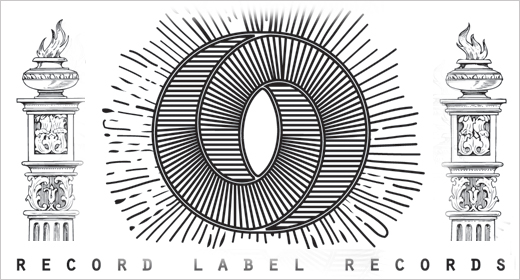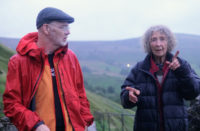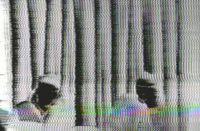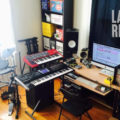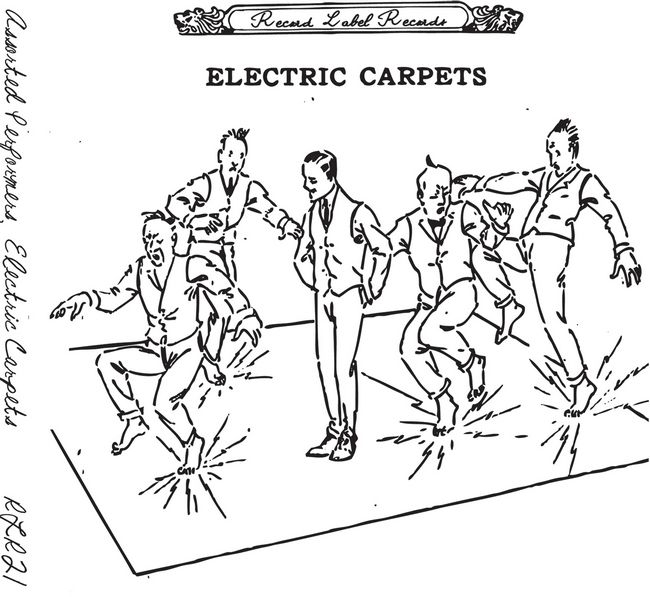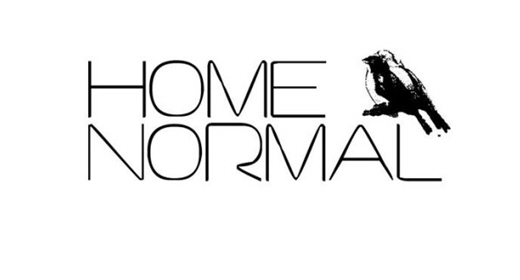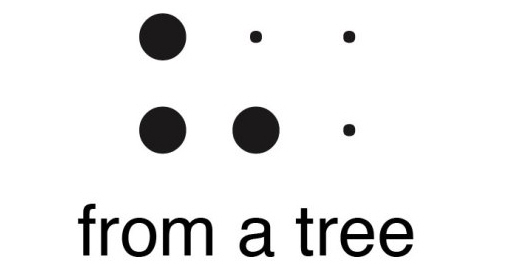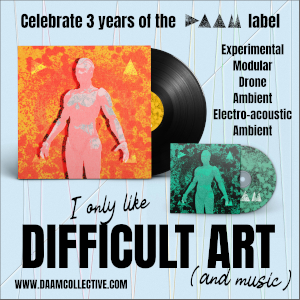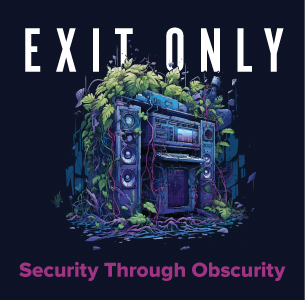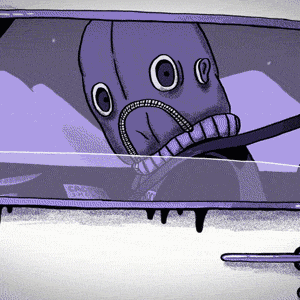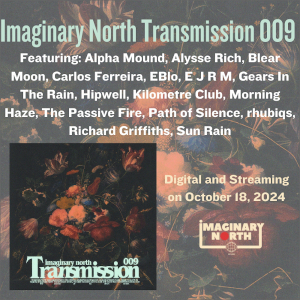RecordLabelRecords‘ own Robbie Martin (aka Fluorescent Grey) takes the Five questions spotlight to new levels with an in-depth historical overview of the label and its spawning. Central RLR theme’s generally hover around “layers of custom-cut sounds, derailed electronics, distorted audio warfare and a virtual smorgasbord of unique electro-acoustic fragments.”
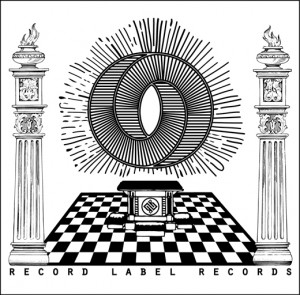 Igloo Magazine :: When did RecordLabelRecords start up and what was your inspiration?
Igloo Magazine :: When did RecordLabelRecords start up and what was your inspiration?
Robbie Martin (RLR) :: RecordLabelRecords technically started back in 1996, as a pseudo umbrella ‘label’ for a self-released track rap parody album I made with a friend riffing off of Coil’s Scatology. At the time, I was trying to discover all this weird music using AOL, pre web browsing, mailing lists and usenet (alt.noise, rec.music.ambient). I then met Kush Arora by typing in ‘noise’ into the music genre profile search in AOL and we struck up a friendship after I discovered that he lived 20 minutes away (and still lived with his parents and was in high school as was I).
I think the Coil mailing list itself was probably the way I discovered most of the music I grew to love like Scorn and Autechre. Brainwashed was just starting up at that time, but by the end of my ‘tenure’ on the list (after the rap parody and my friend and I trolling the list under different aliases), I had already burned several bridges including that of the guy who runs Brainwashed and who ran the old Coil list (who still won’t talk to me 15 years later). I will admit I was a cocky 17 year old who lived in a suburban town where I was the only person my age within a ten mile radius who had heard of these obscure musicians. From Coil’s association with Nurse with Wound, Throbbing Gristle and Psychic TV I had fallen in love with their jarring and psychedelic sounds. Aside from being a chin scratching elitist who didn’t care to have many friends in my home town, I was what most people would describe as straight edge. I had never smoked weed, nor cigarettes, hadn’t done acid, mushrooms or even alcohol. Music like Coil vs Elph Worship the Glitch put me into states that made me feel outside of myself; lying on my bed with headphones, I was constantly listening to this type of music fully sober and by myself. It wasn’t until I did psychedelic drugs for the first time in my twenties when I realized “Oh yeah, this is why this album is called Love’s Secret Domain.” My inspiration overall came from my adoration of the ‘post industrial’ wellspring of creative dark electronic / raw / electro-acoustic / idm music that seemed to have peaked in the mid 90’s. I feel like that aesthetic approach, even if it’s packaged in more modern advertising style branding *now*, its essence is making a big comeback in 2012 and that’s really encouraging to see.
Igloo :: Who were some of your initial artist relations and did your location help or hinder progress?
(RLR) :: My location did both; I grew up in a town where the only music scene for young people was Christian punk. It was only after meeting local experimental artists like Moe Statiano (who at the time was like a local one man band version of Einsturzende Neubauten) and the folks at Ovenguard Records in Berkeley like Chris Stecker and Erik Gallun (whom I met through Kush after they bought his noise tape at Ameoba called Too Pissed to Masturbate) did I really feel connected to any sort of artistic community in the San Francisco bay area. Living in Pleasanton I didn’t venture out to San Francisco, Oakland or Berkeley very much but over time I started to break out of my anti-social shell a little; I was still very young compared to most of the other performers I would play with, so I always had this “out of place feeling.” Almost every show I attended or performed at back then the average attendee’s age was 35, unlike today where noise and experimental shows seem to attract a lot of young people; back then it wasn’t like that at all. At some point shortly after I fell out of the music scene for a while, started ingesting psychedelics regularly and got really into some generic and some really good psychedelic electronic music. Tetsu Inoue gave me some of the best trips. I smoked DMT for the first time while listening to Elevator Drops from World Receiver. I got really into Plastikman, especially Consumed. My DXM/ketamine trips were dominated by 1 hour long techno songs like Fax Records’ “Alien Community.”
The spirit of true industrial music is making a comeback and I think it’s a perfect time to show people that RecordLabelRecords has been there all along; we were just waiting for music fans to come back.
Ben, the free-style rapper who I made Scatology with, I also met on the internet. We met on the Coil list coincidentally and he happened to be my age and lived only 15 minutes away. Both he and I shared an affinity for ridiculing the artsy fartsy self indulgent aspect of a lot of the experimental music scene. I’m sure anyone who’s seen Portlandia and who’s been to a “not very good ‘experimental music show” can appreciate what I’m talking about. He’s partly the reason I got into psychedelics, or I should say his love for Coil’s tales about psychedelics got us into psychedelics. I discovered Soulseek as I was attending audio engineering school, used it to proliferate my own tunes, and met Oliver aka Tomoroh Hidari by trying to pass some fake Matmos tracks to him. He immediately caught on that they were fake and said something like “this isn’t Matmos, but it is interesting,” and after admitting to him it was my own music, he took many hours to walk me through via online chat how to master my album—a really helpful, nice dude.
Igloo :: What were some of the challenges (if any) starting up a label? …and how did you envision the label to stand apart?
(RLR) :: After getting back into music again, and only having RecordLabelRecords as a part time hobby limited edition cassette and CDR label, I decided to rethink the direction and I envisioned something more cohesive that would try to inspire other people to break outside of the ‘electronic music’ or the ‘experimental music’ paradigm but still heavily playing into the best aspects of each ethos. I wasn’t sure if my heart would be more into running a label
or releasing my own music as Fluorescent Grey, so I sent around a demo of my first album Lying on the Floor to several labels, some in Europe, some in the US (one of which was suggested to me by Oliver, Isolate Records) and Canada. Only one person responded, Wai Cheng who ran Isolate Records. He didn’t bother emailing me first, I just remember getting a phone call from this guy who seemed like he didn’t like talking on the phone but seemed very intent on releasing my demo and was extremely interested in what I do and in my process. I was resistant to just releasing what I sent him but he wouldn’t settle for anything less. So I relented and waited 7 months or so for it to come out. During this time he introduced me to the guys in Nommo Ogo who lived out in Oakland and who I much later became good friends with. When the album finally came out, Wai invited me out to his home in Brooklyn, New York for a month long East Coast tour. I learned a lot from Wai about what channels of independent distribution would be the most receptive, and an organized way of doing promotional mailings, touring do’s and don’ts.
Around 2 months after my stay in Brooklyn, suddenly and tragically Wai Cheng died while in Europe visiting some of the other Isolate Records artists. It was a shock for me because I was just getting to know Wai really well and spent time with his mom and dad. Wai’s parents were some of the most supportive and loving I have ever met. Wei’s parents, though seemingly very traditionally Chinese, were funny; his mom would tell us stories about having to hand assemble the packaging to Venetian Snares limited vinyl release Shit Fuckers and she made a point to make sure we heard her say the title loud and clear! Oddly enough, Wai had been in the bay area for almost the whole time I was involved in the scene but we never crossed paths until 12 years later (when he called me on the phone). Through the next few months after things settled down emotionally for me I found a lot of camaraderie, love and passion among people that Wai knew in the San Francisco bay musical world, like-minded folks from Katabatik, Spaz, 5lowershop. These relationships brought about a positive transition for RecordLabelRecords and for myself in life
Igloo :: What is your motivation in keeping the label moving forward?
(RLR) :: I’ve wavered many times in the past about keeping the label going, but right now I feel more motivated than ever before. The spirit of true industrial music is making a comeback and I think it’s a perfect time to show people that RecordLabelRecords has been there all along; we were just waiting for music fans to come back. As a label I have a lot of future plans in the works. I have some interesting re-issue projects on the table right now; the rights have not yet been negotiated but your readers will definitely recognize two of the artists. Pakistani qwalli master Nusrat Fateh Ali Khan’s nephew has some video we may release on DVD of street performances he did.
Igloo :: Tell us more about how you (and your staff?) take the label’s “sound” to the listeners and fans. Distribution, campaigns, word of mouth etc.
(RLR) :: Online information gathering was something I learned early on; I’ve been collecting mailing contacts from across the world since the mid 90’s for tape trades, radio stations, zines. Now it’s moved to blogs, podcasts, print magazines and newspapers. I wasn’t always the best about spreading things literally word of mouth, unless you count internet chatting. I can understand why other record labels have stayed off the digital grid, but we aren’t opposed to it. I do like making very limited edition runs of vinyl, and soon we will be doing only vinyl and cassette. No more glass mastered duplicated CD’s after the Thomas Dimuzio / Voice of Eye split. I personally enjoy CD’s, but practically everyone I know has stopped buying new CD’s. Physical distribution is an uphill battle for us sometimes because our label can’t be pinned down to a sub genre or a spread of sub genres. A lot of our stuff crosses over so we have many different distributors carrying different titles (one distro might only carry our noise or ambient stuff, another only our beat oriented stuff) at any time. Doing the compilations of Electric Carpets and Drinking the Goat’s Blood gave people the opportunity to hear the whole spectrum of what we do. We also wouldn’t have been able to reach our fans without like-minded supportive people like your staff here at igloomag.com.
For more information about Record Label Records, visit their website at www.recordlabelrecords.org.






